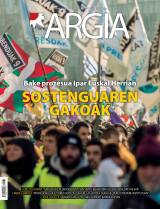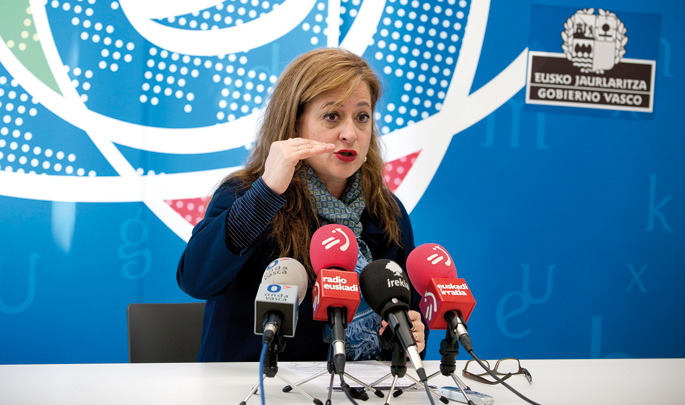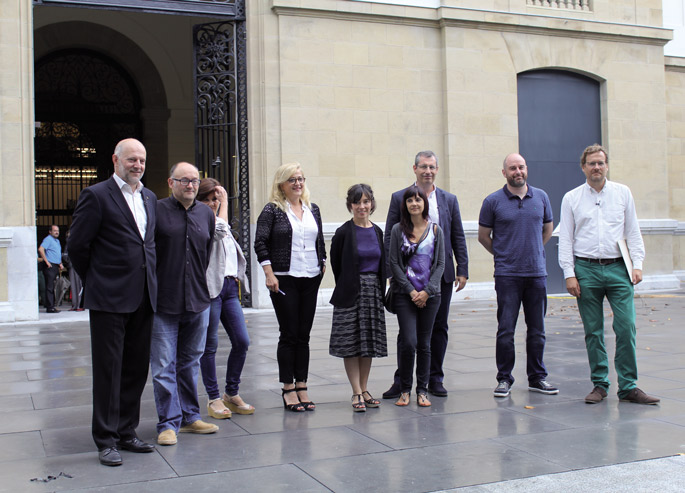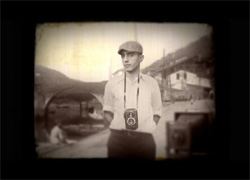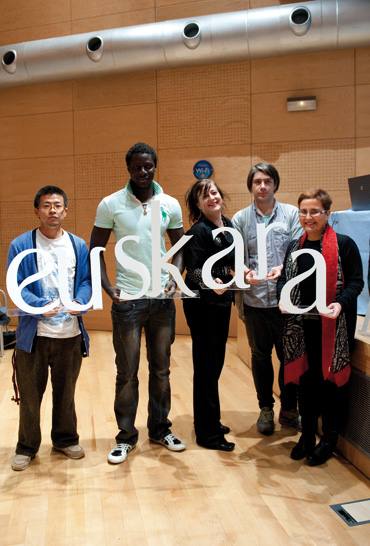"We want to be on hand with all the cultural institutes in the world."
- Tolosarra Irene Larraza is the new director of the Etxepare Institute. It has previously remained in the centre of the Biscay capital for six years, where it has assumed other responsibilities. Know the house well. It has taken him to follow the path started a year ago by Miren Arzalluz, but he would like to see his hand and his ways of doing this work noticed.
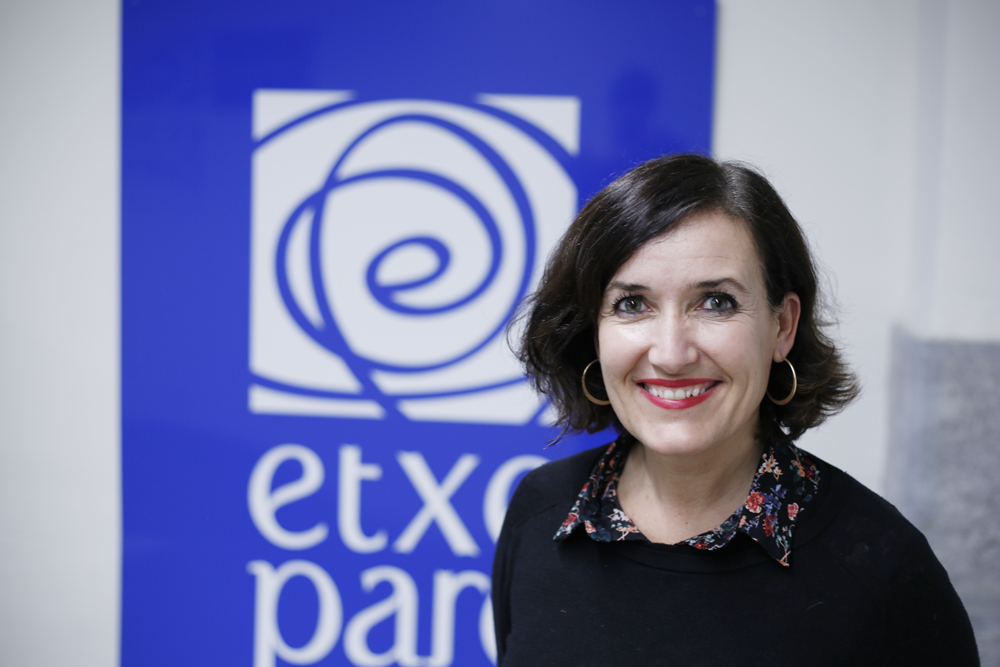
From working in the shadows, to appearing in the headlines of the newspapers. Is this a big change?
Yes, there is a personal leap. I've been on the team for the last six years, and now it's different, because you take responsibility and you're forced to engage with other organizations. I have worked for five years on communication and that brings you closer to most of the issues and areas. So I know the details of the organisation. In the last year I have been the head of culture. As I was dealing with it, this second opportunity came and so I took it.
Look at Arzalluz has barely finished a year in office. Has your hand been noticed in the direction of the institute? Are you going to continue the path you have taken?
Of course, he too took a long time to land. Subsequently, he proposed a four-year planning focused on four objectives: to improve visibility, coordination with other institutions, qualitative growth and the field of cultural diplomacy. All of them were areas previously worked on, but he gave them a new reading. That's the project and the commission I've received. But how to do that, I will be able to influence it, and I would like you to see my input.
“The authors are active, the institution is a bridge,” says your website. Is that still the case in practice?
There is always something to be improved. We have a limited, not very large task force, and our mission is endless. It is therefore necessary to prioritize some lines. Many times we have to respond to many emergencies and, in that case, it is sometimes possible that relationships take less care of themselves. There, as I say, there are things to improve: in the vicinity. I would like to implement that closeness, that it is easy to go to us and that we be transparent. I've already had contact with creators and people from different sectors, and I want to think that that will also help us to be closer. I think that is where I can make my contribution.
Does having a seat in Tabakalera facilitate collaboration with other actors or creators?
I remember when we started in Tabakalera we all talked about “creating synergies.” I wondered if that would be true, because we use a lot of words very easily. But it's true that being under the same roof makes relationships a lot easier.

You work mainly abroad, and perhaps for that reason, there is some misinformation about the work carried out by the Etxepare Institute…
What happens to us is that at home we also need time to explain what Etxepare is. It cannot be said in two words. You have to explain that it is an institution for the external promotion of the Basque Country and the Basque culture; that it diffuses the Basque language through teaching; that it subsidizes cultural promotion and goes to fairs; that it gives voice to our culture before other European institutions … Listening to all this, it does not stay with anything, because it is too long, but so it is. We do everything, and we are all that.
“We have to maintain the value of what
we create today to
show what we are outside.
Without giving
up tradition, of course”
In the midst of globalization, things are becoming more and more similar across the West. How is Basque culture characterized or highlighted at international level, without falling into exaggerated folklore?
The key is creators. Its creators have a level enough to travel to the world without complexes, as well as in all disciplines. Unfortunately, the globalised world is much harder and colder for minority languages. Our globalization begins at home. A language that lives next to a hegemonic language knows what it is without going too far. But we are in favour of the fact that, when we talk about creation in Basque, we are something curious, which interests us. There are many who are amazed that we go to school or court in Basque, because we make films in Basque, because we write in Basque. I think we have to maintain that value of who we are and what we create today to show what we are outside. Without giving up tradition, of course, because we are too.
The absence of a state makes it difficult, I think, to try to position Basque culture and Basque creators internationally? At least on the roads that you cultivate.
It does. We did a job of being on the EUNIC network of Europe's national cultural institutes, and we've managed to be the first institute that doesn't represent a state. But now we are trying to join the global EUNIC group leading that group and the absence of a state makes it difficult for us. But we want to be there, with the institutes in Spain or France, and with everyone else, to work together but on an equal footing.
The word culture covers more and more areas. Does Etxepare have more relationship with some disciplines than with others? Are some prioritized?
I think that at first the Etxepare Institute had a rather traditional structure, but it has been gradually changing. Of course, literature occupies an important place, insofar as it is closely related to language. For the rest, there are disciplines that we have worked very naturally: music, performing arts, cinema, plastic arts… And now, in recent years, we are also focusing on design, architecture and heritage. We have worked less on these fields, and I think we have a small debt.
What and how to help with subsidies is always a thorny issue. What is your goal in this?
Subsidies and trade fairs are, in most cases, designed for those who work in professional creation. It is true that there are other agents and creators who are not in the professional realm, but who are doing things and want to be out. For this reason, in 2017 we recovered a subsidy called “Call for Cultural Dissemination”. The aim is to support creators who are not formally professional. On the other hand, through agreements, sponsorships or other formulae, we promote everything, including projects or non-professional agents. Last year, for example, we promoted 26 projects with Basque agents. We would like, of course, to have more money to distribute more. That is also true.
“The lack of state makes it difficult for us to
join the global EUNIC group with other national cultural institutes in Europe”
The other side of the coin is that often policies such as subsidy, program, condition what and how it arises…
We do not give aid for production, but for mobility. We therefore have no major interference in the content, etc. We do not condition production. The criteria value the experience, the echo of the work being presented... We have also made more room for Euskera. In the past, five points were given to support the works that were in Euskera, and from 2017 ten were awarded. We also value its contribution to the promotion of Basque culture and its integration with the objectives of Etxepare.
Canonization can also be a risk. Coming to the literature, there are few names that have some international projection: Atxaga, Uribe, Cano…
It is true that, despite our efforts for diversity, some names are repeated in our programs. But it has its explanation. On the one hand, there are authors who have this international dimension in themselves, because they have worked in this area, and they have already been translated into different languages. We do not encourage them because they have gone further, but from many places these authors are demanding. On the other hand, writers capable of speaking English or French in round tables are sometimes asked, and not all authors dare to do so. However, I believe that these authors open the way to those who come behind, who demonstrate the existence of the Basque literature.
In that sense, does the Etxepare Institute try to maintain the gender balance?
We try, there's a will. In the proportions, the women that we are moving are many, although we do not have quotas or the like. We are now analyzing the work of last year and, to make the diagnosis, I want to incorporate gender indicators. On the basis of the results, we will see what action we need to take.
Promoting translations is one of the priorities of the Institute. As for literature, is it not a little that translates into other languages?
More than translating, the hard thing is to edit it. We've tried several strategies to help you, but external editors, in general, don't want organizations from the media; they want to directly contact local editors. Some of the roads that have been worked on so far have perhaps not been the most effective, and we want to explore new paths. Our job is to make the work of Basque writers visible, but it is something that must be done in cooperation with the sector.
There are also 35 “readers” and eight chairs around the world, expanding Basque studies and Basque culture. Does it generate interest?
It is an interest that we have to work on. In one place like Boise, for example, it's easier, in others it's not so much. But the dynamic of creating lectorates has a lot of proactive. In an external university, it generates interest in a foreign language and culture. We call the “reader” who is there, but in practice they are a professor and we strive to incorporate this subject into the academic curriculum. In relation to what was said at the beginning, I believe that a challenge is to have a closer relationship with those who are working on this work. It can be a lonely job, the world is very broad, and it is up to us to do that work of weaving networks with sweetness and closeness. This year we also have a rather important novelty: The program for teaching the Basque language in the Basque Country Etxeak in the world has so far been managed by HABE and from now on we will manage it from Etxepare. Another line, in this case more related to the teaching of Euskera.
Etxeko pertsona bat aukeratu du Etxepare Institutuak zuzendari kargua utzi berri duen Miren Arzalluz ordezkatzeko: Irene Larraza izango da Etxepareko zuzendari berria, 2012tik institutuan lan egiten du eta ondo ezagutzen du erakundea.
Etxepare Institutua zuzendaririk gabe geratu da, duela urtebete kargua hartu zuen Miren Arzalluzek Parisko Moda Institutua zuzenduko duela iragarri ondoren.
Etxeparek institutuak jakinarazi duenez azarotik aurrera Habanako Unibertsitatean zabalduko duen irakurletzan ariko da idazle iurretarra Euskara hizkuntzaren historia ikastaroa ematen.
Aurten ere euskal dantza taldeei ukatu egin die Etxepare Institutuak nazioartean emanaldiak egiteko eskaintzen dituen diru-laguntzak eskuratzeko aukera. 2016ko maiatzaren 12an argitaratu da Euskal Herriko Agintaritzaren Aldizkarian (EHAA) Etxepare Institutuaren deialdia artea,... [+]
“Ametsetako uda bizi nahi duzu Europako Kultur Hiriburuan, Donostian?". EHUk eta Etxepare Institutuak antolatu duten Basque Yourself ikastaroa honela iragartzen da.
Araba, Bizkaia eta Gipuzkoako kulturako aurrekontuen murrizketa andanaren berri dakar gaur El Diario Vascok. Batzuk aurreratu genizkizuen joan den astean. Beste batzuk, esanguratsuak, jarraian zerrendatuta:
Aizpea Goenaga antzerkilariak Etxepare Institutuko zuzendaritza 2010eko ekainean hartu zuen arren, joan den astean ekin zion euskal kultura nazioartekotzea xede duen erakundeak bere burua promozionatzeari. Bilboko Arriaga antzokian estreinatutako At! ikuskizuna da institutuaren... [+]









